The Economics and Statistics Division maintains archives of previous publications for accountability purposes, but makes no updates to keep these documents current with the latest data revisions from Statistics Canada. As a result, information in older documents may not be accurate. Please exercise caution when referring to older documents. For the latest information and historical data, please contact the individual listed to the right.
<--- Return to Archive
For additional information relating to this article, please contact:
January 10, 2020HOUSING STARTS, DECEMBER AND ANNUAL 2019 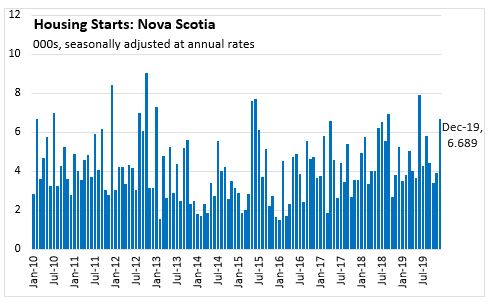
Nova Scotia's housing starts (seasonally adjusted annualized rate) increased 70.2 per cent to 6,689 in December compared to 3,929 in November. Compared to December 2018, housing starts were up 27.7 per cent.
Housing starts were up 92.7 per cent in Halifax to 4,315 compared to 2,239 in November. Halifax starts are up 23.4 per cent compared to December 2018.
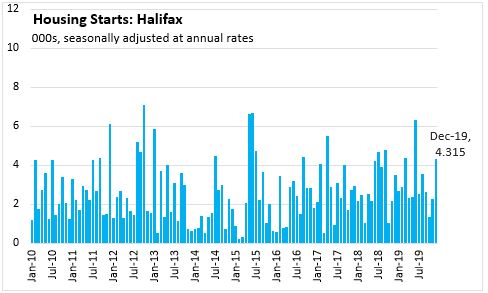
Outside Halifax, Nova Scotia's housing starts are up 40.5 per cent in December to 2,374 versus 1,690 in November. Compared to December 2018, housing starts outside Halifax are up 36.4 per cent.

The six-month moving average of housing starts in Nova Scotia and Halifax increased in 2018 due to higher starts for multiples. After pulling back at the end of 2018 and early 2019, Nova Scotia's housing starts increased over the summer months and the moving average has been steady through end of 2019
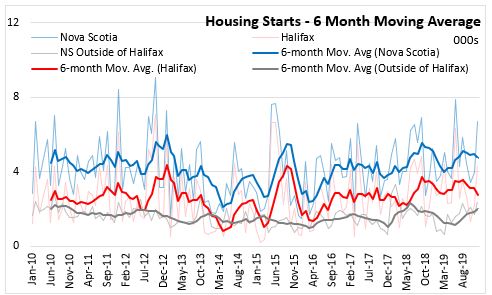
In urban areas, housing starts for multiples are generally higher than for singles with greater variability month-to-month. The six-month moving average for singles increaed in the summer of 2018 and summer of 2019. The pace of multiple starts in urban areas has been more volatile, with peaks in summer of 2018 and summer of 2019.

Nationally, housing starts are down 3.4 per cent in December to 197,329 compared to 204,320 in November. National housing starts are 8.1 per cent lower than in December 2018.
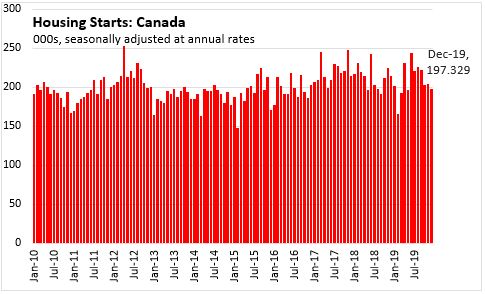
ANNUAL
Nova Scotia's annual housing starts were at a level of 4,719 in 2019, which was 1.4 per cent lower than in 2018. Starts were higher for multiples and lower for singles in 2019.

Since 2011, starts for multiples have outnumbered starts for single detached units in Nova Scotia. In 2019, multiple starts increased to 2,799 while single detached starts fell to 1,920.
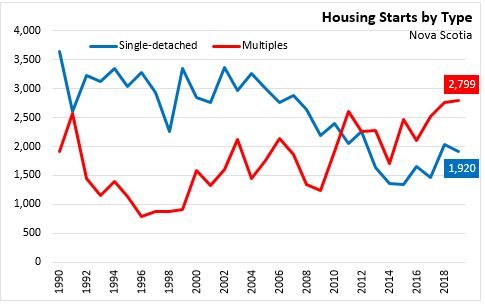
Housing starts were down 2.0 per cent across Canada in 2019. Five provinces reported declines compared to 2018, with the largest declines in Saskatchewan (-32.8 per cent), Newfoundland and Labrador (-13.8 per cent) and Ontario (-12.4 per cent). Housing starts were down 1.4 per cent in Nova Scotia in 2019. Prince Edward Island (+19.9 per cent) and New Brunswick (+26.1 per cent) reported the largest increases in housing starts over 2018, while there were smaller increases in British Columbia (10.0 per cent), Alberta (+4.8 per cent) and Quebec (+2.3 per cent).
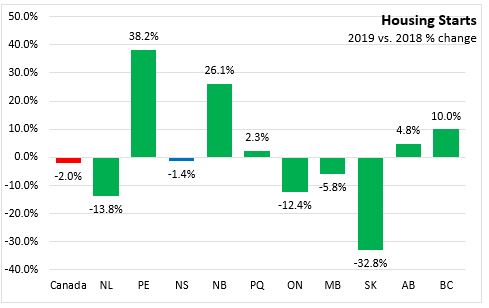
Note: Urban areas are defined as areas over 10,000 people
Table 34-10-0158-01 Canada Mortgage and Housing Corporation, housing starts, all areas, Canada and provinces, seasonally adjusted at annual rates, monthly (x 1,000)
Table 34-10-0156-01 Canada Mortgage and Housing Corporation, housing starts in all centres 10,000 and over, Canada, provinces, and census metropolitan areas, seasonally adjusted at annual rates, monthly (x 1,000)
Table 34-10-0126-01 Canada Mortgage and Housing Corporation, housing starts, under construction and completions, all areas, annual
<--- Return to Archive